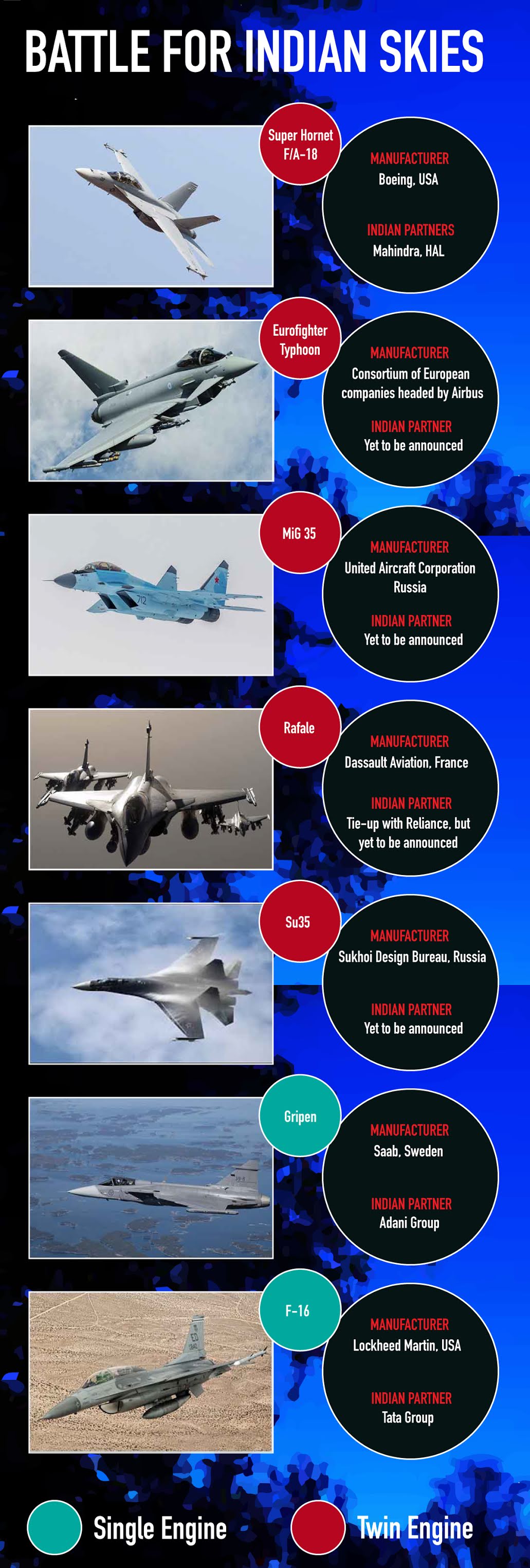Dassault, Boeing And SAAB— The Front-Runners For IAF's 114 Fighter Jet Contract

Dassault’s Rafale, Boeing’s F/A-18 and Saab’s Gripen lead the pack, while the Lockheed Martin F-16 and the Eurofighter Typhoon are trailing
New Delhi: France’s Dassault Aviation, American firm Boeing and Swedish Saab are the front-runners for the Indian Air Force’s multi-billion dollar contract for 114 fighter jets. However, the Russians are still in contention with two aircraft, as is US manufacturer Lockheed Martin.
Top sources in the defence establishment told ThePrint that the main competition is between the Dassault’s Rafale, Boeing’s F/A-18 and the Saab Gripen, even though a total of seven aircraft are vying for the mega deal.
The IAF has finalised the Air Staff Quality Requirements (ASQR) for the fighter programme and has moved the file for getting the Acceptance of Necessity (AON) from the Ministry of Defence.
Following this, the IAF will come out with an Expression of Interest (EOI) and finally the Request for Proposal (RFP).
“With the elections round the corner, the IAF expects to get the AON immediately once the new government is sworn in. The IAF expects the EOI to be issued by the second quarter of this year and the RFP by the last quarter,” a top source said.
However, industry sources feel this is a tall order in terms of time tables.
Restarting The Process
The IAF had last year issued a Request for Information (RFI) after its previous bid to procure 126 fighter jets was scrapped, following the deal for 36 Rafales in fly-away condition.
A total of seven companies had responded to the RFI, including two companies each from the US and Russia.
Boeing’s F/A-18E/F Super Hornet Block III, Lockheed Martin’s F-16 Fighting Falcon Block 70, Dassault’s Rafale F3R, Eurofighter Typhoon, Saab’s Gripen E, the Russian United Aircraft Corporation’s MiG-35 and Sukhoi Corporation’s Su-35 were the ones who responded.
How The Contenders Fare
Sources said that the Rafale is highly priced but the since the one-time payment for India-specific enhancements has already been made, any future Rafales bought will be cheaper.
The IAF, which had shortlisted the Rafale in 2012 under the now-scrapped tender for 126 fighters, is keen on more of the same kind.

Another serious contender is Saab’s Gripen, which is a single-engine fighter. Following the decision to buy 36 Rafale fighters, the IAF had moved a proposal to buy a single-engine fighter, and the Gripen was the front runner. However, the government, keeping in view that the indigenous Light Combat Aircraft Tejas is already in the making, opened the contract to both single and twin-engine aircraft.
Boeing’s F/A-18, meanwhile, is also in the race for a naval project. Sources said if at all a decision is to be made to buy an American fighter, then it would be the F/A-18, not the F-16.
Incidentally, Lockheed Martin, the maker of the F-16, has offered what it calls a new aircraft F-21. However, IAF sources say it is nothing but re-branding of the F-16 with a few additional features.
There has been much unease in the IAF about using an F-16 because the Pakistan Air Force (PAF) has been operating them for years. In the air battle on 27 February, the PAF had used the F-16 against India, one of which 16 was shot down by the vintage MiG-21 Bison of the IAF.
Talking about the two Russian aircraft, MiG-35 and Su-35, sources said that the force is actually looking for a Western fighter since the Su-30MKI is already in use with the IAF.
The issues that go against the Russians are lower serviceability ratio and size. The IAF had to create special hangars for the Su-30MKI because it was bigger than other aircraft in use with the force. The serviceability ratio of a SU-30MKI still stands at just 58 per cent, meaning that out of 100 aircraft, only 58 are available for flying at any given time. The rest are in service or down due to a lack of spare parts.
Things that go in favour of the Russians include the fact that the price of both the MiG-35 and the Su-35 will be cheaper than the rest, as well as the fact that Russia has remained a strong ally of India and has a huge equity in the Indian system. The biggest of all factors in their favour is that the production facility of Russian aircraft is already in India, courtesy HAL, which manufactures the Su-30MKI.
As far as the Eurofighter Typhoon is concerned, the biggest factor that going against it is the multi-national nature of its ownership — Eurofighter comes under Airbus and is jointly owned by Germany, Italy, the UK, France and Spain. Sources said this was “problematic”.



No comments:
Post a Comment